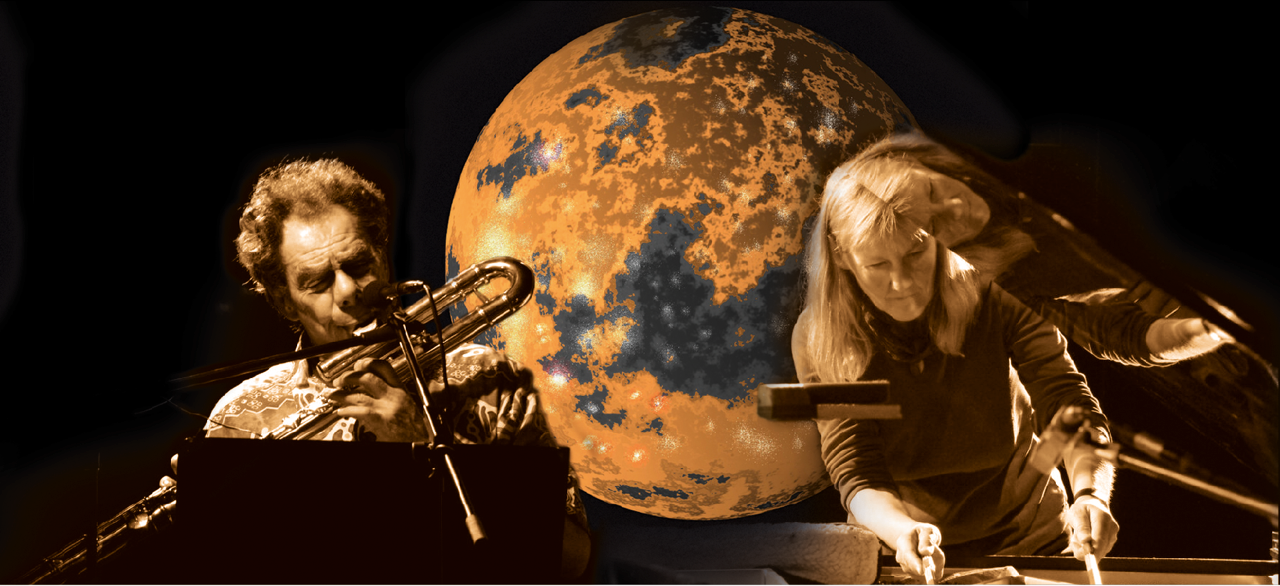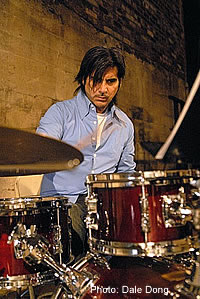Interpretations: Robert Dick / Ursel Schlicht / Gustavo Aguilar
Thursday, February 9, 2017, at 8:00 pm
This is an archived event, not part of the current festival.
Two compelling adventurous new projects blending improvisational intensity with compositional formalism, paying tribute to Galileo and Jorge Luis Borges.
The Interpretations Series presents flutist Robert Dick and pianist Ursel Schlicht at Roulette to celebrate the release of their CD "The Galilean Moons", a suite inspired by each of the four Jovian moons discovered by Galileo, and co-created for the Festival Cervantino in Mexico. Intense, driving, radiant, elegant and sometimes raw, the duo has re-invented the flute-piano combination. Robert will play the full range of flutes, from ethereal piccolo to the profound contrabass flute and Ursel is a masterful pianist both on the keyboard and conjuring voices from inside the instrument.
"The Galilean Moons" has been selected as one of the "best of 2016" by the NYC Jazz Record. Along with "The Galilean Moons", the duo will play pieces by both Dick and Schlicht, created individually and together. These include the wild "Dark Matter", the first chamber work to use internet spammers' random word blocks and the beautiful, dramatic "A Lingering Scent of Eden".
In the days before their Roulette performance on February 9, Robert Dick and Ursel Schlicht will have just performed at the Dark Music Days Festival in Reykjavik, Iceland.

 The Gustavo Aguilar Get Libre Collective will be premiering But We Must Build As If The Sand Were Stone, an evening-length work for quartet featuring Anthony Davis (piano), Earl Howard (live electronic processing), JD Parran (woodwinds) and Gustavo Aguilar (percussion). Based on the writings of Jorge Luis Borges, Aguilar's composition will explore the potentials of embracing the need for continuity, while also allowing for a kind of slipperiness to exist, intentionally, as a stance against what cultural critic Henry Giroux refers to as the "politics of clarity"—an homogenizing tendency toward cleansing knowledge "of complex discourse or oppositional insights."
The Gustavo Aguilar Get Libre Collective will be premiering But We Must Build As If The Sand Were Stone, an evening-length work for quartet featuring Anthony Davis (piano), Earl Howard (live electronic processing), JD Parran (woodwinds) and Gustavo Aguilar (percussion). Based on the writings of Jorge Luis Borges, Aguilar's composition will explore the potentials of embracing the need for continuity, while also allowing for a kind of slipperiness to exist, intentionally, as a stance against what cultural critic Henry Giroux refers to as the "politics of clarity"—an homogenizing tendency toward cleansing knowledge "of complex discourse or oppositional insights."
 Return to Schedule
Return to Schedule





